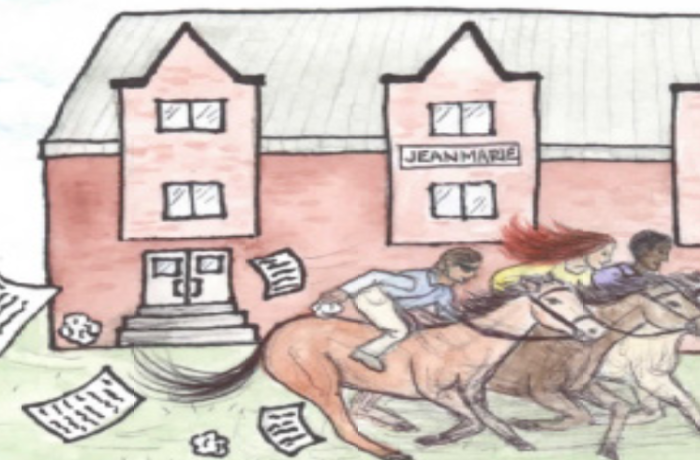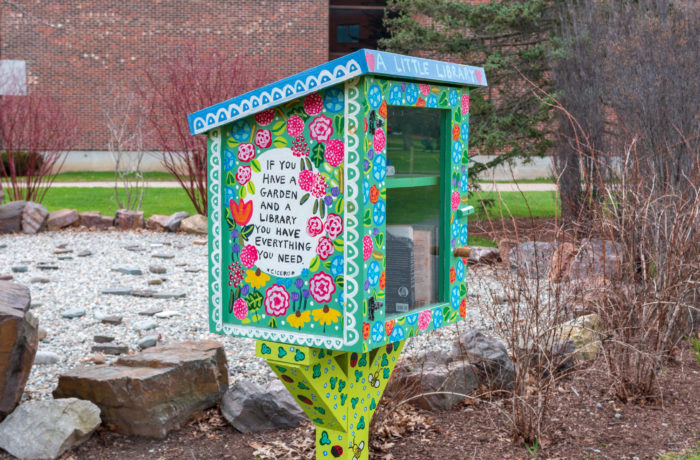
Throughout his childhood, Michael Carter ’12 often attended church with his mother and two sisters, where he developed a fascination “strange and mysterious” symbols throughout St. Anthony’s Church in Burlington. It grew so much that he joined the Edmundites immediately after graduating from college.
Marcel Rainville grew up in an Edmundite parish in Swanton, Vt. and graduated from St. Michael’s seminary in 1967. He might never have become a priest had it not been for his understanding of the Edmundite brothers specifically, which reminded him of his own large family.
Nearly 3,000 miles south and almost 30 years later, Lino Oropeza ’11, then 10 years old, told his parents that he wanted to be a priest, inspired by Edmundite priests at his home parish in Venezuela.
The bond in priesthood that originally inspired these men, each ordained priest today, now haunts them, even though they are miles away from priests and bishops under scrutiny because of investigations of sexual abuse of children, and others, and the widespread coverup of the crimes.
“It is like in your family when one of your siblings has done something really bad, you feel shame,” said Oropeza. “We are family and we feel when somebody in the family does something wrong.”
A collar of shame
“When I walk around I can feel the eyes on me–people making a judgement call, not based on me, the individual, but based on the institution,” Rev. Carter, S.S.E. said.
The judgement felt by modern day priests in the Catholic church is rooted in heinous crimes and coverups discovered by a group of investigative reporters in Boston in 2002, in Pennsylvania by a grand jury just a month ago, and in Burlington a few weeks ago when a Buzzfeed report brought renewed publicity to abuse in a Catholic orphanage that closed in the 1970s.

“When I put that collar on it’s a symbol that people have an opinion about. Sometimes for the good sometimes for the bad,” Carter said.
Unlike Carter and Oropeza, Rev. Rainville, S.S.E., was a practicing priest during the first big sexual abuse scandal in the church, in which the Boston Globe exposed more than 70 abusive priests from the archdiocese of Boston and a strategic coverup by the local archbishop.
“I was so naive about that kind of thing,” Rainville said. “I didn’t even know it existed. It was a shocker.”
Has prevention worked?
After the news coverage, bishops from around the country convened in Dallas, and wrote the Charter for the Protection of Children and Young People, which outlined the importance of training priests to create a safe environment for children, how to support victims of assault, reporting to the civil authorities, and disciplining priests who abuse the trust given to them.
All Catholic priests must now take part in related trainings, especially at the beginning of their priesthood, and re-do them every few years.
According to Carter, the no tolerance policy from 2002 has worked relatively well. “The things that are coming to haunt us now are things that were covered up and suppressed in the past,” he said.
Rev. Oropeza, S.S.E. said that the new policy’s effectiveness has been a relief, noting that while the cases of abuse surfacing in Pennsylvania are horrible to hear about, he takes comfort in the fact that only two of them occurred within the recent decade.
But bishops function at a different level. “The priests are under control but where’s the control for the bishops?” Carter asked. A large part of current investigations have been into the coverup by bishops and higher level clergy.
Carter referred to the church network as a “boys club,” analygous to tales his father told him of working in Vermont law enforcement. “The first reaction for members of a tight knit group like that is you protect your own. I don’t think that that is remotely helpful,” he said.
The Most Rev. Christopher Coyne, bishop of Burlington, made numerous statements in recent weeks regarding the scandals nationwide, and at the orphanage.
“Our bishop here sees that [bishops] need to see the laws written in Dallas as for them too. I think some bishops felt exempt from the disciplinary spirit of that document,” Rainville said.
“I don’t worry that it will lead people to lose trust in the church, I know it will.”
Even less helpful than “protecting your own” in times of delicate crisis is using the crisis as a platform for political gain. The former chief Vatican diplomat in the United States published a letter in response to the report from Pennsylvania, calling for Pope Francis’ resignation, turning more watchful and judgemental eyes toward the church.
“His disclosure came at a very convenient time and he has this agenda behind it where he’s trying to sort of undermine some of the more “liberal ideas” by Francis. I personally view it as kind of a hatchet job for score settling in an ideological way within the church,” Carter said.
“We have these petty church politicians that are making this crisis, where we have real victims and real issues, a battleground for their own ideologies. I don’t know if he cares about the security of children at all.”
The flock dwindles
Horrifying reports paired with deceitful leaders in an ideological battle crumbles the stage for maintaining a strong community of people, many of which see the church as their moral compass. What happens when it appears that their compasses is pointing in a completely different direction?
“I don’t worry that it will lead people to lose trust in the church, I know it will,” Carter said.
“The church has seen a huge downturn and I think part of that could be from what happened in 2002. It kind of gave people permission to leave the church,” Rainville said.
The PEW Research Center reported in 2015 that more than half of Americans raised Catholic leave the church at some point in their lifetime. Nearly 30 percent of people never return to the religion in anyway. According to Rainville, within the last 30 years alone, one-third of Catholics have left the church. If that emigrating population formed their own church it would be the third largest denomination of Christianity in the country.
Straight talk at the pulpit

Each of the priests have mentioned the scandals in their homilies during Mass, inviting people to both share in their disappointment and anger, and to come to them in times of questioning their faith.
“People need to vent their true emotion and they need to get it out there. I too need that too, but I don’t want to dictate to people how they should feel. The fact that people want to come talk to me is a positive thing,” Carter said.
“I’m in a great deal of pain emotionally from hearing about this institution that I love and that I’ve always really had positive experience with. What I don’t want to have happen is for me to say, ‘Oh no, pity me as a priest, this is so hard and so difficult for me,’ when there are people that have been victimized, assaulted, raped and all the strange things, by people in a position of trust.”
What about the believers?
It is too early in the semester to notice if the recent scandals affected students enough to leave the church, Carter said. He has however discussed the matters with students, particularly after preaching about it.
Maggie McKeon ’19 has worked closely with the Edmundites since freshman year, originally as a work study student for campus ministry, becoming more involved over the years, leading various retreats.
“My faith is between me and God,” she said. “Humans are imperfect, and while it is terrible that some priests have done awful things, and kept it hidden for so long, my faith has more to do with God than some priest I don’t know.”
Oropeza relies heavily on the core definition of Catholicism and Christianity during this time. He emphasized that Christians by definition are followers of Jesus Christ. It is important to him that Catholics remember that priests and bishops are the messengers not the message.
“We have to understand that everyone in the church, from the pope down, are all sinners–some more than others. We are all imperfect people,” Oropeza said.
“You might be disappointed of the priest, you might be disappointed in the bishops that didn’t do anything while this was happening. I am too. But does that change my faith in Jesus? Jesus was not only a preacher, or a teacher, but a healer. This is a time when we need so much healing, and the only one that can provide that healing is Jesus.”
Blame and consequences
For Rainville, one of the few good things about incidents like this is that it makes clergymen humble. “We’re not gods, God dammit,” he said slightly chuckling, before becoming somber again.
“We have to materialize that, and appropriate that for ourselves personally. Until everything we do comes from a place of deep humility, our message is not going to be effective.”
Last week, Pope Francis called on the bishops’ conference presidents to gather at the Vatican in Rome in February.
“I hope that everybody who has a leadership role will come to an understanding that this chastisement, this humiliation is for us first,” Rainville said. ”We have to inform ourselves in order to uphold who we pretend to be and the message we pretend to bring to the world.”
In the future, Carter hopes that the church let’s go of the “protect your own” mentality, in order to move on. “We need to open up the secrets and just bring everything out. The church needs to follow its own laws, like the Catholic sacrament of confession.
“Of course that will be embarrassing for the church, people may leave the church because of that. But, what are we defending at this point? There’s no veil of respectability for us to hide behind anymore, no more damage can be done to the institution that it has not already done to itself.”
Seeking hope
On the local level, priests are not only turning to prayer, almsgiving, and fasting, but also focusing on ways to help victims who are coming forward.
“It is despicable what happened to victims, and it is our responsibility as a church to help them move forward,” Oropeza said.
To remain hopeful, many Catholics are trying to find a light amongst the darkness overtaking the news.
“I feel like sometimes the news can be one-sided and just brings up these scandals, and some people could think that that is all there is to the Catholic church,” McKeon said. “Yes this horrible stuff is happening, but that’s not the Catholicism that I’ve experienced. The majority of the priests are great, and there’s a lot of different charity that Catholics do.”
Meanwhile, the Edmundites said they have chosen to deal with the revelations and its pain with humility.
“We are unworthy servants of the mission of the Gospel,” Rainville said. “That calls for deep prayer. We have to put that unworthiness on ourselves first before we put it on anybody else.”


